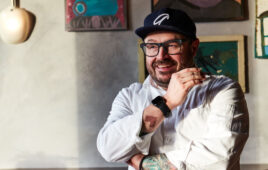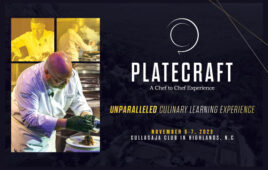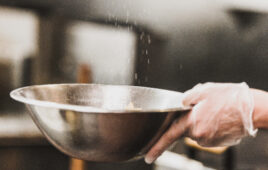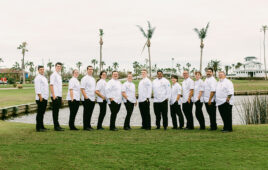 Just 10 years after arriving from Argentina at the age of 20, Emanuel Vodolin has already used his expertise in steakhouse and ethnic cuisine to help take the Alpine Country Club to new, award-winning heights.
Just 10 years after arriving from Argentina at the age of 20, Emanuel Vodolin has already used his expertise in steakhouse and ethnic cuisine to help take the Alpine Country Club to new, award-winning heights.
Emanuel Vidolin came to the U.S. from Argentina 10 years ago, to start a new life with his family. After toiling in restaurants and resorts in Utah, he landed his dream job, first as Sous Chef and then Executive Chef at Alpine Country Club in Highland, Utah. Now an active American Culinary Federation member, a multiple “Best of State” culinary award winner, and a major player in the restaurant community around Salt Lake City, Chef Vidolin has already made his mark—by the ripe old age of 30. We thank Emanuel for taking time to discuss his already-rich history of experiences in the club industry, and for sharing some of his interesting approaches to steakhouses and other emerging trends in club cuisine.
|
Emanuel Vidolin
Chef Profile Current Position: Executive Chef, Alpine Country Club, Highland, Utah |
Q Chef, you mentioned that two generations of your family operated bakeries in Argentina. How did your experience in the family business prepare you for what you are doing now?
A I started working there when I was 15 years old, and I did it for about 5 years. Looking back, I think it was a great experience, because I not only learned how to bake, I also learned the business side of the operation and people management. At age 18, I was hiring and firing, making orders to suppliers and organizing our deliveries to the big superstores, who were our wholesale customers.
Q Can you talk about the steakhouse concept you’ve developed at Alpine, and also about “butter-poached” steak?
A While I was a Sous Chef here, I saw that a lot of members asked for cuts of beef we didn’t have on the menu, and that people were also always asking for different side dishes for the steak entree that was on the menu. This was also happening with the other meats. So I added the “Alpine Steak House” concept, where members can pick their meat, side dishes and sauce. It works great: Before we started this concept, we sold about 190 steaks a year; now we have almost tripled that amount.
Our “butter-poached, dry-aged” steak has also helped to generate more interest. It is a very simple and gentle cooking method, but the results are great. We poach dry-aged prime rib in clarified butter with garlic, shallots and herbs, and finish it on the grill to the desired temperature. The meat becomes very flavorful and tender!
Q Chef, you talk about the diversity of your membership, with a mix of older, lifetime members and many newer and younger members. Each group has different expectations. What challenges does this pose for you at Alpine?
A Big ones—but I love big challenges! Essentially, we have two different markets, with different cultures, needs and wants. On one hand, you have members who want creative and trendy dishes, like you’ll find in Vegas or New York. On the other, you have those who want more traditional dishes, and where price becomes an issue. We try to serve both with a menu that is all-inclusive—so while we serve Kobe beef and Berkshire pork chops with a Burgundy poached apple, we also serve chicken pot pie and a Reuben sandwich.
Q You attend continuing education programs at The Culinary Institute annually. How do they keep you coming back, and can you talk about some of the knowledge that you’ve come away with?
A As a chef, it’s important to keep up to date with what is happening—new products, new techniques, new equipment, etc. Usually I’m the youngest chef in the class, but when it comes to cooking, I find myself at the same level with chefs who’ve been in the business since I was just starting to walk. This is a great feeling, to reaffirm how I’m progressing in the field.
Q Alpine has reciprocity with a few clubs in the Salt Lake area. There are pros and cons to reciprocal dining. How does this affect what you’re trying to achieve, and how you operate, at your club?
A The Salt Lake clubs are what everyone looks up to, so having their members come here and rave about our food makes me feel great. At the same time, about 49% of our membership lives in the Salt Lake area, which is about 50 miles from here. With gas prices soaring and a slow economy, the option to dine at another club can be an important convenience for many of them.
Q Emanuel, you came to the U.S. from Argentina just 11 years ago, with virtually no cooking experience, and worked your way up to the Executive Chef position at Alpine. What advice could you offer young chefs with the same aspirations?
A I have been very lucky, because I was able to apprentice with some of the best chefs in the country. I always went to work not only to make my shift and get my paycheck, but also to learn. Work has been, and still is, my school—I learn something every day, whether it’s from a dishwasher or from the GM.
I will also say, though, that while I love this career, I don’t think it’s for everybody. Before you spend your money in culinary school, you should work at a restaurant, since not all of us are Mario Batali. Even if you get lucky enough to become “another Mario,” you have to work very hard first for many years, with no holidays, no weekends and sometimes some very long days.
Q Your club recently won “Best of State” awards for “Best Fine Dining” and “Best Latin American/Mexican Restaurant.” How did your membership and staff react to “taking home the gold”?
A I think that it made our members feel very proud, since we are the only country club restaurant in the state to ever win this award. This is also the first award our club has ever won. It is a great honor for me to be the first Executive Chef to help make it happen for our club. Our staff was very happy, especially the cooks. And I’ve made it clear that the award also belongs to them and to our General Manager, who is always supporting my new ideas and encouraging me to bring unique foods to our members.




